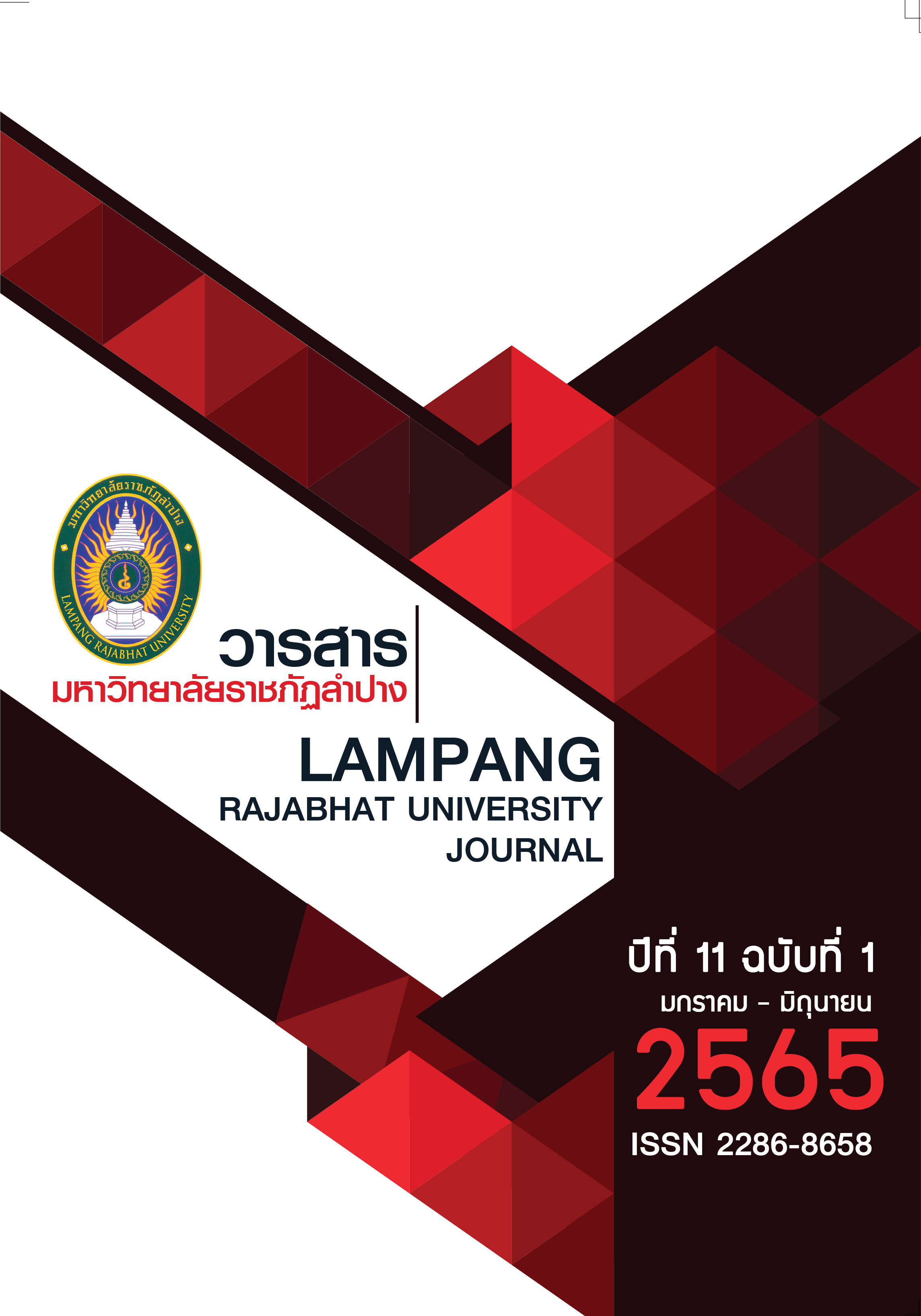Analytical Thinking Ability of Grade 7 Students Taught by Science Inquiry Method Cooperated With Graphic Organizer Technique
Keywords:
Graphic Organizer, Analytical Ability, Science Inquiry MethodAbstract
The study of this research was to develop the analytical ability and learning achievement of Grade 7 students taught by Science inquiry method cooperated with using graphic organizer technique in thermal energy chapter. The data collected by using Pre-Experimental Designs with One Group Pretest – Posttest. The populations of this study consisted of 25 Grade 7 students from Ban Pangoong, Chiang Mai Province that all students are ethnicity people. The research instruments consisted of 2 parts 1) the research instrument was 7 lesson plans 2) the collecting data instrument consisted of 2 parts. The quantitative data were analytical ability test and learning achievement test. The qualitative data was learning achievement recording form in Science subject of the students who was taught by inquiry method cooperated with using graphic organizer technique. The statistics of this research analyzed by mean, percentage and standard deviation. The research found that students had analytical ability in every parts of study especially analytical ability scores of students the post-test scores increased than the pre-test scores and the learning achievement in Science subject of the students who was taught by inquiry method cooperated with using graphic organizer technique had average score with 78.80 so there was higher than the required criteria.
References
กระทรวงศึกษาธิการ. (2560). ตัวชี้วัดและสาระการเรียนรู้แกนกลาง กลุ่มสาระการเรียนรู้วิทยาศาสตร์ (ฉบับปรับปรุง พ.ศ.2560) ตามหลักสูตรแกนกลางการศึกษาขั้นพื้นฐาน พุทธศักราช 2551. กรุงเทพฯ: โรงพิมพ์ชุมนุมสหกรณ์การเกษตรแห่งประเทศไทย จำกัด
เกรียงศักดิ์ เจริญวงค์ศักดิ์. (2556). การคิดเชิงสร้างสรรค์ (Creative thinking). พิมพ์ครั้งที่ 10. กรุงเทพฯ: ซัคเซส มีเดีย.
จินตนา สุจจานันท์. (2556). การศึกษาและการพัฒนาชุมชนในศตวรรษที่ 21 (Education and Community Development in the 21st Century). กรุงเทพฯ: โอเดียนสโตร์.
ชัยวัฒน์ สุทธิรัตน์. (2559). เทคนิคการใช้คำถามพัฒนาการคิด. พิมพ์ครั้งที่ 5. กรุงเทพฯ: วีพรินท์ (1991).
ประพันธ์ศิริ สุเสารัจ. (2556). การพัฒนาการคิด. พิมพ์ครั้งที่ 5. กรุงเทพฯ: 9119 เทคนิคพริ้นติ้ง.
มณฑกานต ยืนนาน. (2561). ผลการจัดการเรียนรู้แบบสืบเสาะหาความรู้(5E)ร่วมกับเทคนิคผังกราฟิกเรื่องการรักษาดุลยภาพในร่างกายที่มีต่อผลสัมฤทธิ์ทางการเรียนและทักษะกระบวนการทางวิทยาศาสตร์ขั้นบูรณาการของนักเรียนชั้นมัธยมศึกษาปีที่ 5 จังหวัดบุรีรัมย์. วิทยานิพนธ์ศึกษาศาสตรมหาบัณฑิต คณะศึกษาศาสตร์มหาวิทยาลัยสุโขทัยธรรมาธิราช.
มาเรียม นิลพันธุ์. (2558). วิธีวิจัยทางการศึกษา. พิมพ์ครั้งที่ 9. นครปฐม: โรงพิมพ์มหาวิทยาลัยศิลปากร.
สถาบันทดสอบทางการศึกษาแห่งชาติ. (2561). รายงานผลการทดสอบทางการศึกษาระดับชาติขั้นพื้นฐาน(O-NET) ชั้นมัธยมศึกษาปีที่ 3 ปีการศึกษา 2561, [ระบบออนไลน์], แหล่งที่มา https://www.niets.or.th/th/, เข้าดูเมื่อวันที่ 10/04/2562.
สถาบันส่งเสริมการสอนวิทยาศาสตร์และเทคโนโลยี. (2561). คู่มือการใช้หลักสูตรรายวิชาพื้นฐานวิทยาศาสตร์ ระดับมัธยมศึกษาตอนต้นกลุ่มสาระการเรียนรู้วิทยาศาสตร์ (ฉบับปรับปรุง พ.ศ.2560) ตามหลักสูตรแกนกลางการศึกษาขั้นพื้นฐาน พุทธศักราช 2551. กรุงเทพฯ: องค์การขนส่งสินค้าและพัสดุภัณฑ์.
สำนักงานการศึกษาขั้นพื้นฐาน. (2560). การประเมินการอ่าน คิดวิเคราะห์และเขียน ตามหลักสูตรแกนกลางการศึกษาขั้นพื้นฐาน พุทธศักราช 2551(ปรับปรุง 2560). กรุงเทพฯ: โรงพิมพ์ชุมนุมสหกรณ์การเกษตรแห่งประเทศไทย จำกัด.
สำนักงานรับรองมาตรฐานและประเมินคุณภาพการศึกษา (องค์การมหาชน). (2554 – 2558). รายงานการประเมินคุณภาพภายนอกรอบสาม (พ.ศ.2554 – 2558) ระดับการศึกษาขั้นพื้นฐาน.
Ausubel, D. (1963). The psychology of meaningful verbal learning. New York: Grune & Stratton.
Budnitz, N. (2003). What do We Mean by Inquiry?, [Online]. Available HTTP://www.biology.duke.edu/cibl/inquiry/what_is_inquiry.htm, access on 22/01/2018.
Elizabeth Buckhold. (2008). Graphic Organizers, [Online]. Available HTTP://buckhold.weebly.com/uploads/4/4/9/2/4492138/graphic_organizers.pdf, access on 19/01/2018.
Downloads
Published
How to Cite
Issue
Section
License
Copyright (c) 2022 Lampang Rajabhat University Journal

This work is licensed under a Creative Commons Attribution-NonCommercial-NoDerivatives 4.0 International License.
บทความลิขสิทธิ์ของวารสารมหาวิทยาลัยราชภัฎลำปาง






